Owning an RV is about more than just the freedom of the open road—it’s also about taking care of your home on wheels. Regular maintenance ensures the longevity of your vehicle, prevents costly repairs down the line, and ensures your safety on the road. In this blog, we’ll dive into the tools every RV owner should have in their toolkit, offering a mix of must-have essentials and advanced gadgets that can make your RV repair journey smoother.
Gear Up for the Journey: An Introduction to RV Maintenance Essentials
The road to a long-lasting RV starts with regular maintenance. Like any vehicle, RVs require consistent care to function at their best. But maintaining an RV is not just about keeping it running—it’s about empowering yourself as an RV owner. By equipping yourself with the right tools, you’re ready to handle unexpected challenges on the road, avoid unnecessary trips to the mechanic, and ensure a smoother journey.
The Power of Preparation
Investing in a well-stocked RV maintenance kit offers peace of mind. It ensures that when issues arise—whether it’s a loose bolt, a small leak, or a minor electrical fault—you can handle the problem efficiently. Knowing you have the necessary tools to take on basic repairs provides confidence, saving you time and potentially hundreds of dollars in repair fees.
Must-Have Tools vs. Nice-to-Have Gadgets
While it’s easy to get lost in a sea of high-tech gadgets and accessories, it’s essential to differentiate between the must-have tools that can get you out of a jam and the nice-to-have items that make life more comfortable. Core mechanical and diagnostic tools should always take priority, while advanced tools and luxury gadgets can be added later as your repair skills grow.
The Foundation of RV Care: Must-Have Mechanical Tools
Every RV maintenance kit starts with basic mechanical tools, the essential components that allow you to perform a wide range of tasks from tightening bolts to repairing electrical faults.
Essential Mechanical Tools
Wrenches and Screwdrivers: These are your bread and butter. A sturdy set of wrenches and screwdrivers is non-negotiable. You’ll need them for tightening and loosening bolts, replacing parts, and making quick adjustments. Choose adjustable wrenches for versatility and opt for both flathead and Phillips screwdrivers to cover a range of screws.
Socket Set: A comprehensive socket set with various sizes is critical for working on different RV components. A good socket set provides more precision and leverage than a standard wrench, especially in hard-to-reach areas.
Torque Wrench: Over-tightening can be just as damaging as leaving something too loose. A torque wrench ensures that bolts and nuts are tightened to the manufacturer’s recommended torque specifications. This tool is particularly useful for ensuring your wheels and critical components are securely fastened without the risk of overtightening.
The Role of a Multimeter
Electrical repairs are a common part of RV maintenance, and having a multimeter is invaluable. This device measures voltage, current, and resistance, helping you troubleshoot electrical issues like faulty wiring, bad fuses, and dead batteries. Using a multimeter safely is crucial; always ensure the RV is disconnected from power before testing circuits to avoid electric shock.
Beyond the Basics: Specialized Tools for Advanced RV Repairs
For RV owners who enjoy getting hands-on with more advanced repairs, a set of specialized tools can be game-changers. These tools go beyond the basics and are perfect for specific repair tasks that arise in an RV environment.
Sealant Guns for Waterproofing
Water damage is a major concern for RV owners, making waterproofing a high priority. A sealant gun allows you to apply sealants accurately and efficiently, whether you’re repairing a roof seam or sealing a window. Pair it with RV-specific sealants designed to withstand the rigors of outdoor life and prevent leaks in key areas.
Caulking Kit for Weatherproofing
Weatherproofing goes hand in hand with waterproofing, and a high-quality caulking kit is essential for this task. The kit enables you to reseal joints, windows, and doors, providing an additional layer of protection against wind, rain, and extreme temperatures.
Diagnostic Scanners
Modern RVs come with complex onboard systems that often require digital diagnostics. RV-specific diagnostic scanners help troubleshoot issues in your vehicle’s engine, electrical system, and other components. These scanners read the error codes generated by your RV’s system, helping you quickly identify the source of a problem and determine whether you can fix it yourself or need professional assistance.
Safeguarding Your Second Home: Preventative Maintenance Tools
One of the best ways to avoid costly repairs is by staying proactive. Preventative maintenance keeps your RV in tip-top shape and can prevent small issues from becoming major headaches. There are specific tools designed for this purpose that every RV owner should consider.
Lubricants and Rust Removers
Rust and corrosion are major threats to any vehicle, especially RVs exposed to the elements for extended periods. Lubricants, such as WD-40, are vital for keeping moving parts like hinges, latches, and slides in good condition. Rust removers and inhibitors prevent rust from spreading and damaging the metal components of your RV.
Tire Pressure Gauges
Tire maintenance is critical for the safety and efficiency of your RV. Under-inflated tires lead to uneven wear and higher fuel consumption, while over-inflated tires increase the risk of a blowout. A tire pressure gauge allows you to monitor tire health easily and make adjustments as needed, ensuring optimal performance on the road.
Digital Multimeter for Electrical Health
While we discussed using a multimeter for troubleshooting, it’s also an essential tool for preventative maintenance. Regularly checking the electrical systems in your RV—especially batteries, wiring, and outlets—helps you catch potential issues before they become serious problems. A digital multimeter can quickly assess the health of your electrical systems and alert you to any irregularities.
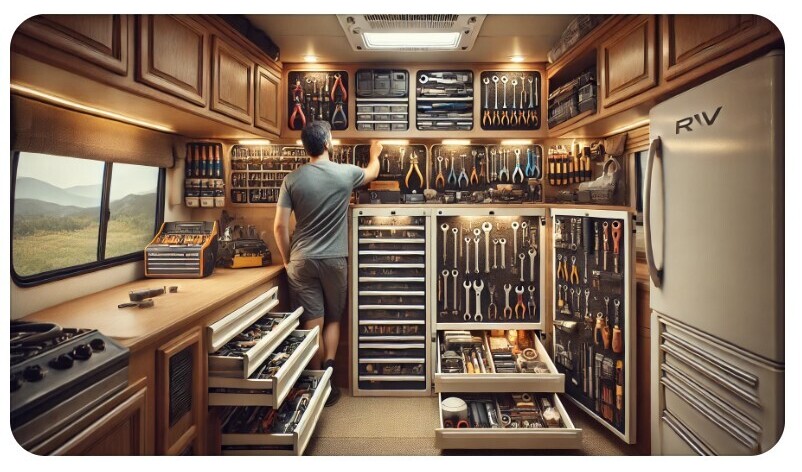
THIS WOULD BE TOO MANY TOOLS TO HAVE ON BOARD! BUT WE SEE PEOPLE DO IT.
Organization and Storage: Keeping Your RV Tools in Check
Once you’ve gathered all your essential tools, the next step is figuring out where and how to store them. RVs are compact spaces, and keeping your tools organized is crucial for both convenience and safety.
Best Practices for Tool Storage
Storing tools properly ensures they remain in good working condition and are easily accessible when you need them. The last thing you want is to waste time digging through drawers or storage compartments looking for a specific wrench or screwdriver. A good practice is to organize tools by category—mechanical, electrical, preventative maintenance—and store them accordingly.
Tool Chests and Bags for Mobile Environments
RV owners need durable, space-saving storage solutions, and a high-quality tool chest or bag is perfect for the job. Look for storage options that are designed specifically for mobile use, meaning they have padded interiors to protect tools from bumps and a variety of compartments to keep everything in place. Some RV owners opt for tool rolls, which are compact and easy to store in tight spaces.
Space-Saving Storage Solutions
In an RV, space is at a premium. Use magnetic strips for holding metal tools, stackable bins for smaller items, and over-the-door organizers to maximize storage. You can also look into custom-built storage solutions that make the most of your available space, ensuring your tools are securely stored and easy to access.
The Unseen Hero: Maintaining Your RV Maintenance Tools
Just as your RV needs regular upkeep, so do the tools you rely on to keep it in top condition. Taking the time to clean and maintain your tools ensures they remain functional and safe for years to come.
Regular Cleaning and Tool Maintenance
After each use, wipe down your tools to remove dirt, oil, and grime. For tools with moving parts, apply a light lubricant to prevent rust and ensure smooth operation. Storing your tools in a dry environment also helps protect them from moisture and corrosion, two factors that can significantly shorten the lifespan of your gear.
Replacing Worn-Out Tools
Even the best tools wear out over time. Pay attention to signs of wear, such as cracked handles, bent wrenches, or malfunctioning power tools. Using damaged tools not only makes repairs harder, but it can also lead to accidents. Replace tools as needed to maintain your ability to perform repairs safely and effectively.
When to Call a Professional
There are limits to DIY RV maintenance. While most owners can handle basic repairs and maintenance with the right tools, there are certain tasks—like engine overhauls or complicated electrical rewiring—that are best left to the professionals. Knowing when to stop and call for expert help can save you from making costly mistakes.
Please be sure the person you call is qualified for your type of RV! Look for an RVIA technician!
Maintaining your RV doesn’t have to be intimidating. With the right tools and a bit of know-how, you can handle most repairs and upkeep on your own, ensuring your RV is always road-ready. By investing in essential tools, organizing your storage, and maintaining both your RV and your tools, you’ll enjoy the freedom of the open road with confidence. Happy travels!
This article outlines specific items you might want to have onboard your RV!
To learn more about us you can read this article.

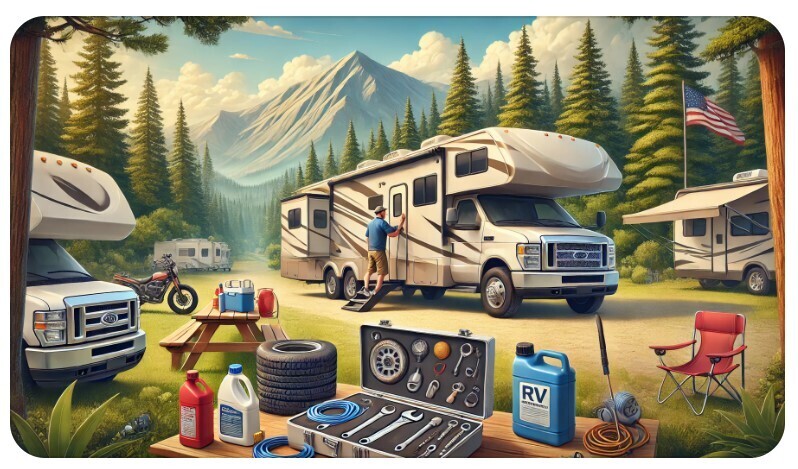
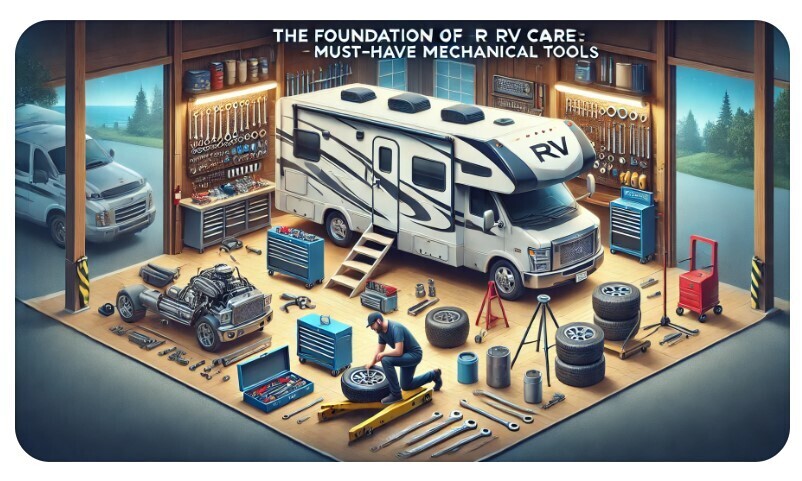
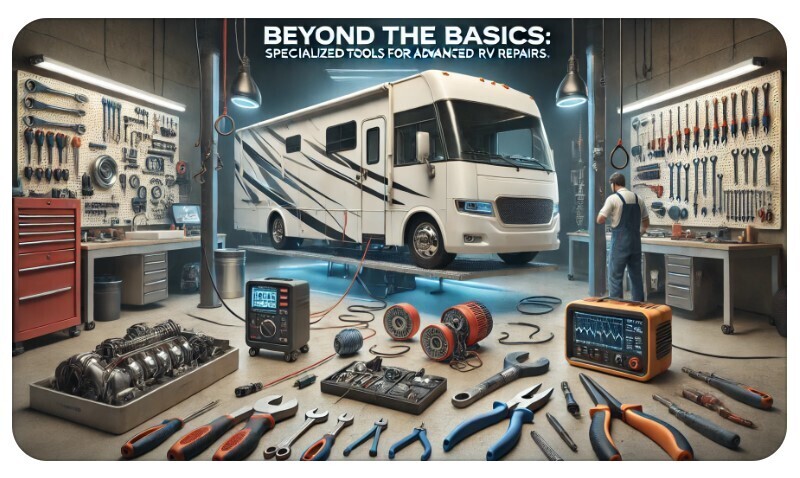
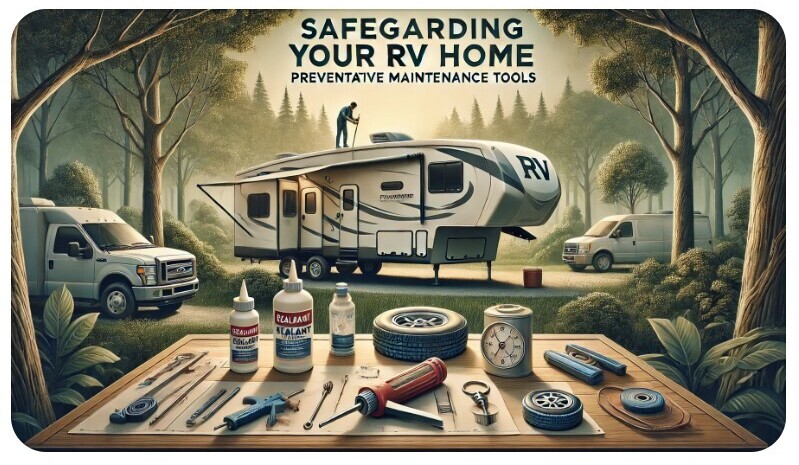
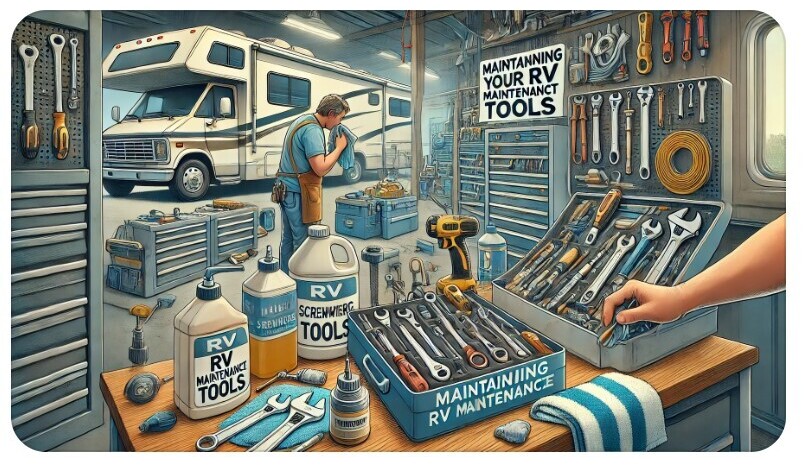



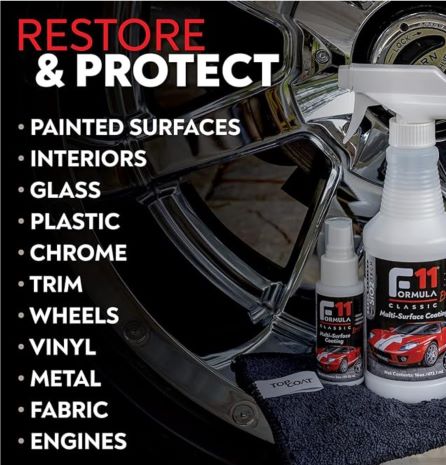
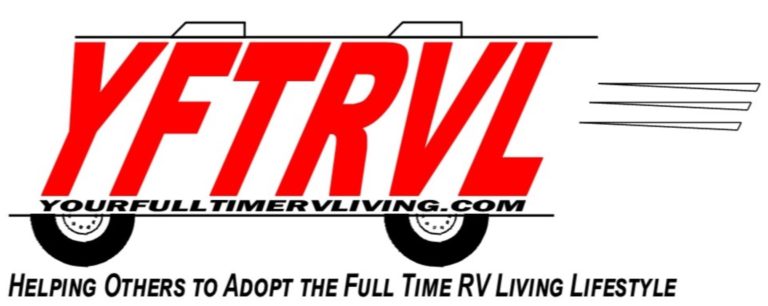



2 comments
How beautifully you have explained all things in detail. Many RV owners don’t know how to maintain their mobile homes and what things are essential for its up keeping. Your writing is very beneficial in this concern. I always prefer to do my RV cleaning and maintenance on my own. For my RV roof cleaning, I am currently using Roof Cleaner/Protect that is an ecofriendly, biodegradable, specially designed roof cleaner. It is the best roof cleaner that I have experienced because once it is exposed to oxygen it emulsifies the dirt from the surface of the roof and provides a very clean surface on the roofing membrane.
Author
Thanks for sharing!